● ● ●
Among the things
proscribed by the 1919 Treaty of Versailles was the Great
General Staff (Großgeneralstab) of the German Army. The
treaty stipulated that it was to be abolished, the victorious
Allied powers believing that it was a key component of the
“Prussian militarism” they sought to eradicate. And this was true
in the sense that the Great General Staff was the intellectual
center of the German Army: the institution that above all others
embodied its corporate personality. And for that reason the
victors’ proscription was only partly effective, for though the
administrative framework of the Great General Staff was
dismantled its spirit lived on.
The origins of the Great
General Staff may be traced to the seventeenth century and the
reign (1640-88) of Frederick William, Electoral Prince of Brandenburg,
remembered in history as the Great Elector (der
Große Kurfürst).
At the conclusion of the Thirty Years War the Great Elector's
domain, Brandenburg-Prussia, was a hodgepodge of disconnected
territories stretching across northern Germany from East Prussia to the Rhine. To
provide his patchwork inheritance with a unifying institution
the Great Elector created a standing
army, paid for by the central government and officered by the
Junker nobility. This force, some 45,000 men strong by the time
of his death, was to become the Prussian and later the German
Army.
Such a standing army
required administrative support and to provide this the Great
Elector established a Quartermaster-General’s Staff, responsible
for military engineering, fortifications, selection of routes of
march and other technical matters; a Paymaster-General’s
Department; a Commissary-General’s Department (supply), an
Enforcer-General (military police) and a Master-General of
Ordnance (design and provision of weapons). Together these
staffs and departments came to be called the General Staff
Service (Generalstabsdienst). The growth of Prussia and
its army in the subsequent reigns caused these staffs to be
enlarged and they were invested with additional
responsibilities, e.g. the collection of military intelligence
and the preparation of serviceable military maps. But as yet
there was no body of staff officers responsible for operational
military planning, nor a chief of staff to advise the
commander-in-chief, i.e. the monarch. Frederick the Great (King
Frederick II; reigned 1740-86) commanded the army in person and
was in effect his own chief of staff. But during the Seven
Years War, theaters of operations were scattered and Frederick
sometimes found himself compelled to devolve responsibility on
subordinate commanders. In such cases he assigned a staff
officer with the title of adjutant-general to the commander's
headquarters, who served as the monarch's representative
and functioned somewhat in the manner of a chief
of staff.
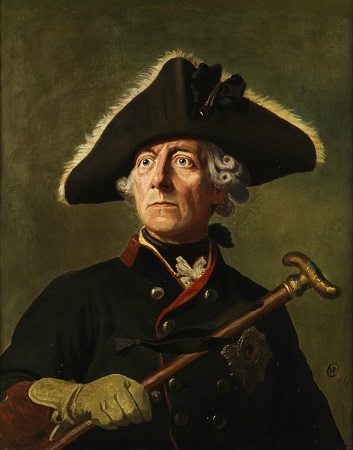
Portrait of
Frederick the Great by Wilhelm Camphausen (Wikimedia Commons /
Public Domain)
In Frederick's time the
officer corps of the Army remained the preserve of the landed
aristocracy—the Junker class. But significantly, the Generalstabsdienst was
an exception to this rule. Much of its work required technical
qualifications that officers of noble background mostly lacked.
So—somewhat grudgingly at first—men of middle-class background
were accepted into those arms and services requiring a technical
education, like the engineers, the artillery and the
Quartermaster General's Staff. Relatively few
such officers were to be found in the Prussian Army up to the
time of the French Revolution, but their existence was a portent
of the future.
At the end of the
eighteenth century, the staff functions of the Prussian Army
were embodied in the Ober-Kriegs-Kollegium (Supreme War
Council), of which the Quartermaster-General's Staff was a part.
It was at this time that the officers of the
Quartermaster-General's Staff first received a distinctive
uniform: light blue coat with red facings, dark yellow waistcoat
and trousers. But neither the Ober-Kriegs-Kollegium nor
the Quartermaster-General's Staff bore responsibility for
operational military planning or possessed any powers of
command. The development of that kind of general staff was the
result of a great military disaster.
In 1806-07, Prussia met
catastrophic defeat at the hands of Napoleon. The Prussian Army,
still organized and commanded in accordance with the principles
laid down by the great Frederick, proved unable to cope with the
new, flexible tactics pioneered by the mass armies of revolutionary France
and employed to devastating effect by the warlike Emperor of the
French.
Defeat on the field of battle was absolute and it reduced the once-proud Kingdom of
Prussia to the status of an abject Napoleonic vassal, its army
shattered, its territory occupied by the victor. But that defeat
also sparked a reform movement, civil and military, that was to
lay the foundations of the Great General Staff.
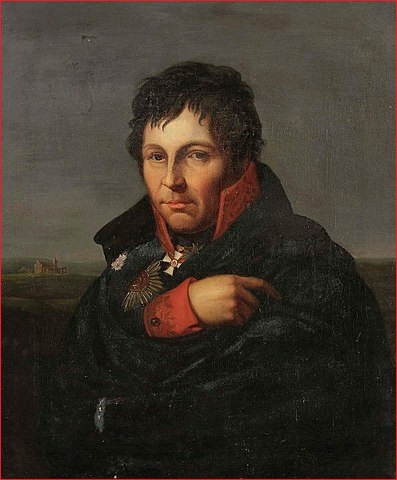
Portrait of Gerhard von
Scharnhorst by Friedrich Bury (Wikimedia Commons / Public
Domain)
The driving force was
provided by the circle of military reformers who gathered around
Gerhard von Scharnhorst, a Prussian officer of Hanoverian
origin. The military reforms proposed by this group called for
the replacement of the old mercenary army by a national army
based on the principle of universal military service, backed up by a
people’s militia (Landwehr). These were radical
departures from tradition that provoked much resistance from the
conservatives who arrayed themselves around King Frederick
William III. In the eyes of such men, universal military service
and a people's militia seemed tantamount to social revolution.
Even more radical,
however, was Scharnhorst’s proposal for a General Staff with
responsibility for military planning, headed by a Chief of Staff
to serve as the monarch’s responsible military adviser.
Moreover, this new General Staff would provide chiefs of staff
for army commanders in the field, and these men would bear
responsibility for the advice they gave. Scharnhorst’s intention
in this was to invest the General Staff with a formal role in
the direction and control of the Army. The staff officers would
constitute a distinct corps, educated in a common body of
military doctrine. And this—the creation of a General Staff
Corps—was the innovation that would endow the Great General
Staff with its special character and influence. But once again,
the King and his conservative circle stood opposed. Frederick
William believed that such a General Staff would drive a wedge
between him and his officer corps, undermining the ethos of
personal loyalty to the monarch that lay at the heart of
Prussian military tradition.
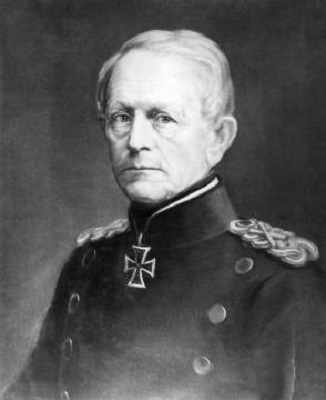
Field Marshal
Graf Helmuth
von Moltke (Wikimedia
Commons / Public Domain)
So conservative opposition
prevented Scharnhort’s reforms from being fully implemented and
though a good deal of progress was made, it was not until the
mid-nineteenth century that his vision was fully realized. The key
figure was Field Marshal Graf Helmuth von Moltke (Moltke the
Elder). In 1857 he was made Chief of the General Staff, a
position he was to hold for the next thirty years. At that time
the General Staff was a distinctly subordinate organization
within the Prussian military establishment. The Chief of Staff
himself was junior to the Minister of War; he had no powers of command nor any right of access to the
monarch. But Moltke came into office at a time when military
reform, domestic Prussian politics and the wider affairs of
Germany were in flux. The advent of Bismarck, the Danish,
Austrian and Franco-Prussian wars, and the unification of
Germany played their part in the Great General Staff’s rise to
the pinnacle of the military establishment.
Victory over Austria in
the war of 1866 was Moltke’s first great achievement. His plan of campaign,
exploiting the capabilities of railroads and the telegraph,
brought the war to a swift and successful end, excluding Austria
from German affairs and setting the stage
for the country's unification under Prussian leadership. The
climax came with victory over France in the war of 1870-71 and the
subsequent proclamation of
the German Empire. These resounding triumphs were to echo down
the years.
In theory, Bismarck's Germany was a federal polity whose army was
made up of contingents supplied by its constituent states. But such was
the prestige of the Prussian Army that it molded the character
of this new German Army, and the Prussian Great General Staff became the
nation's highest military authority.
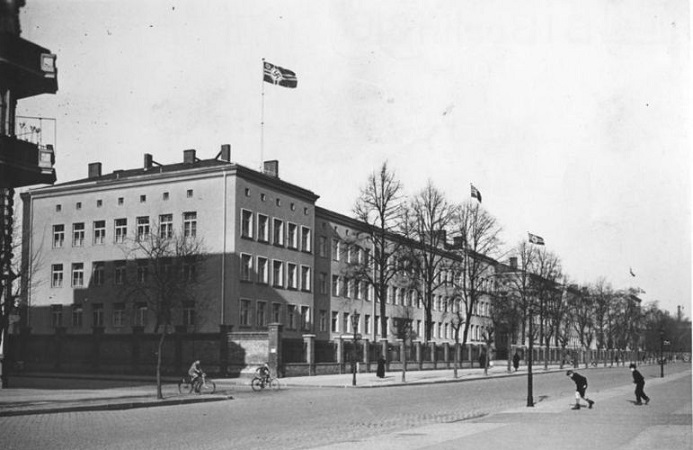
The Kriegsakadamie in
1938 (Photo: Bundesarchiv)
Under Moltke the General
Staff Corps thus became the German Army’s elite institution. To
qualify for it an aspirant had to be nominated by a superior
officer, graduate from the War Academy (Kriegsakademie),
and serve a two-year probationary period. Only then would he be
permitted to wear the crimson trouser stripes and
silver-embroidered crimson collar insignia of the General Staff
Corps. His subsequent service would alternate between the Great
General Staff in Berlin and various field appointments, e.g. as
an operations officer in an infantry division—the latter
characterized as service with Troops General Staff (Truppengeneralstab).
The Chief of the Great
General Staff himself had no formal powers of command but he did
have a channel of communication to the chiefs of staff of army
corps and field armies. He was thus in a position to influence
command decisions. And since the Great General Staff bore
primary responsibility for both military planning and the
formulation of military doctrine, he could be sure that his
subordinates in the field were men of like mind to himself. And
this, indeed, was the Great General Staff's defining
characteristic: not that it sought to nurture military genius
but that it developed a corps of highly competent staff
officers, schooled in a common military doctrine, whose influence
extended over the whole army.
Thus it was
that the formal abolition of the Great General Staff in 1919 did
not destroy its corporate identity. The officers of the General
Staff Corps remained, and best of them were taken into the Reichswehr,
the 100,000-man army permitted to Germany by the Treaty of
Versailles. Many served in the Troops Office (Truppenamt),
which performed the headquarters staff duties essential to any
military organization. The Truppengeneralstab lived on as
well in the staffs of the Reichwehr’s group commands,
military districts and divisions.
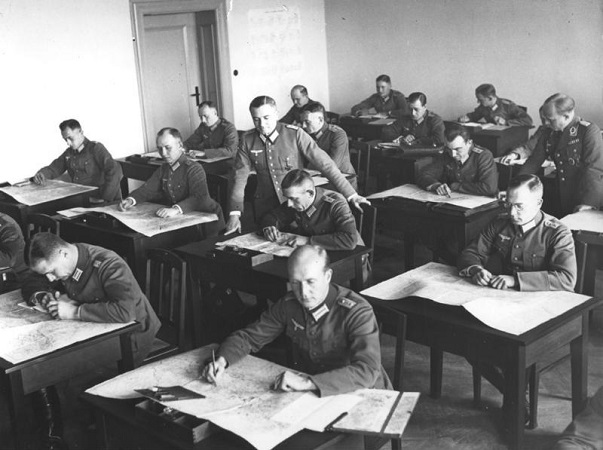
A class at the Kriegsakademie,
late 1930s (Photo: Bundesarchiv)
Even so,
when the hour struck for German rearmament and the Great
General Staff was reestablished as the High
Command of the Army (Oberkommando
des Heeres or OKH),
it was unable to reclaim its former status. The great Moltke’s principles of co-responsibility and common
education were incompatible with the Führerprinzip,
the top-down authoritarianism of the National Socialist
state. And Hitler personally viewed the Army’s senior
leadership with dislike and distrust—negative feelings that
extended to the General Staff Corps. The Great General
Staff’s restoration thus sowed the seeds of its decline and
final disappearance in 1945.